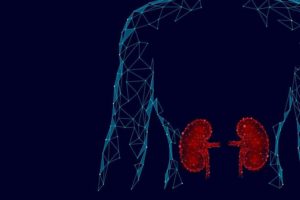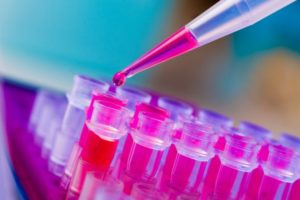Cushing Syndrome Specimens
Bay Biosciences provides high quality, clinical grade bio-samples, cryogenically preserved blood samples from petrosal sinuses, saliva samples, sera (serum), plasma and peripheral blood mononuclear cells (PBMC) biofluid specimens from patients diagnosed with Cushing Syndrome.
The sera (serum), plasma and peripheral blood mononuclear cells (PBMC) biofluid samples are processed from patient’s peripheral whole-blood using customized collection and processing protocols. The Cushing Syndrome bio-specimens are collected from unique patients diagnosed with Cushing Syndrome and are provided to a valued pharmaceutical customer for translational research, genomics, proteomics and biomarker research, drug discovery and development.
Cushing Syndrome Overview
Cushing’s Syndrome is a hormonal disorder caused when the body produces high levels of the hormone called cortisol over a long period of time. Prolonged exposure to glucocorticoids such as cortisol causes Cushing’s syndrome, which is also known as hypercortisolism. Cortisol also called the “stress hormone” because it helps the body respond to stress. Cortisol comes from the adrenal glands, which sit on top of the kidneys. It helps your body:
- Maintain blood pressure
- Regulate blood glucose, also called blood sugar
- Reduce Inflammation
- Convert the food you eat into energy

Cushing’s syndrome signs and symptoms may include high blood pressure, abdominal obesity with thin arms and legs, reddish stretch marks, a round red face, a fat lump between the shoulders, weak muscle, weak bones, acne and fragile skin that poorly heals. Female patients may have more hair on their body and irregular periods. Occasionally there may be headaches, changes in mood and a chronic feeling of fatigue.
Cushing’s syndrome most often affects adults, usually between the ages of 30 to 50 years, but the disease can also occur in children. Cushing’s syndrome is more prevalent in female patients, it affects about three times as many women as men. In patients who have type-2 diabetes and blood glucose levels that stay too high over time, along with high blood pressure, Cushing’s syndrome may be the cause. People who take medicines called glucocorticoids, which are similar to cortisol, also can develop Cushing’s syndrome. This type of Cushing’s syndrome is called “exogenous.” More than 10 million Americans take glucocorticoids each year, but it’s not unknown how many of them develop Cushing’s syndrome.
Cushing Syndrome Signs and Symptoms
Signs and symptoms of Cushing’s syndrome vary. Patients who have very high levels of cortisol for a long time are likely to have clear signs of the disorder. Following are the Common signs and symptoms of Cushing syndrome:
- Acne
- Weight gain (particularly around midsection and upper back)
- Thin arms and legs
- A round face
- Increased fat around the base of the neck
- A fatty hump between the shoulders (buffalo hump)
- Thinning fragile skin, easy bruising
- Slow healing of cuts, insect bites and infections
- Wide pink or purple stretch marks, mainly on the abdomen, thighs, breasts, hips, and under the arms
- Weak muscles
Signs and symptoms women with Cushing syndrome may experience
- Thicker or more visible body and facial hair (hirsutism)
- Irregular or absent menstrual periods
Signs and symptoms men with Cushing syndrome may experience
- Decreased libido
- Decreased fertility
- Erectile dysfunction
Other signs and symptoms that may occur with Cushing syndrome
- Severe fatigue
- Muscle weakness
- Depression, anxiety and irritability
- Loss of emotional control
- Cognitive difficulties
- New or worsened high blood pressure
- Headaches
- Increased pigmentation of the skin
- Bone loss, leading to fractures over time
- In children, impaired growth
Children with Cushing’s syndrome tend to have obesity and grow more slowly than other children.
Cushing Syndrome Causes
Excess levels of the hormone cortisol are responsible for Cushing syndrome. Cortisol, which is produced in the adrenal glands, plays a variety of roles in the body. For example, cortisol helps regulate the blood pressure, reduces inflammation, and keeps the heart and blood vessels functioning normally. Cortisol helps the body respond to stress. It also regulates the way you convert (metabolize) proteins, carbohydrates and fats in your diet into usable energy. However, when the level of cortisol is too high in the body, you may develop Cushing syndrome.
The role of corticosteroid medications
Cushing syndrome can develop from a cause outside of the body (exogenous Cushing syndrome). One example is taking oral corticosteroid medications in high doses over an extended period of time. The most common cause of Cushing’s syndrome is the long-term, high-dose use of the cortisol-like glucocorticoids. These medicines are used to treat other medical conditions, such as asthma, rheumatoid arthritis and lupus. Glucocorticoids are often injected into a joint to treat pain. Use of glucocorticoids also suppresses the immune system after an organ transplant to keep the body from rejecting the new organ.
Endogenous Cushing’s Syndrome
Endogenous Cushing’s syndrome is very rare, “Endogenous” means something inside your body is causing the disorder rather than something outside your body, such as medicine. Estimates vary, ranging from about 40 to 70 people out of every million.
The body’s own overproduction of Cortisol
The condition may also be due to the body’s own overproduction of cortisol (endogenous Cushing syndrome). This may occur from excess production by one or both adrenal glands, or overproduction of the adrenocorticotropic hormone (ACTH), which normally regulates cortisol production.
- A pituitary gland tumor (pituitary adenoma): A noncancerous (benign) tumor of the pituitary gland, located at the base of the brain, produces an excess amount of Adrenocorticotropic hormone (ACTH), which in turn stimulates the adrenal glands to make more cortisol., when this form of the Cushing’s disease develops. It occurs much more often in women and is the most common form of endogenous Cushing syndrome.
- An ACTH-secreting tumor: Rarely, a tumor that develops in an organ that normally does not produce ACTH will begin to secrete this hormone in excess, resulting in Cushing’s disease. These tumors, which can be noncancerous (benign) or cancerous (malignant), are usually found in the lungs, pancreas, thyroid or thymus gland.
- A primary adrenal gland disease: In some patients, the cause of Cushing syndrome is excess cortisol secretion that doesn’t depend on stimulation from ACTH and is associated with disorders of the adrenal glands. The most common of these disorders is a noncancerous tumor of the adrenal cortex, called an adrenal adenoma. Cancerous tumors of the adrenal cortex (adrenocortical carcinomas) are rare, but they can cause Cushing syndrome as well. Occasionally, benign, nodular enlargement of both adrenal glands can result in Cushing syndrome.
- Familial Cushing syndrome: Rarely, patients inherit a tendency to develop tumors on one or more of their endocrine glands, affecting cortisol levels and causing Cushing syndrome.
Cushing Syndrome Complications
Cushing’s syndrome can cause health problems such as:
- Heart attack and stroke
- Blood clots in the legs and lungs
- Frequent or unusual infections
- Bone loss (Osteoporosis) which can result in fractures
- High blood pressure (Hypertension)
- Loss of muscle mass and strength
- Unhealthy cholesterol levels
- Depression or other mood changes
- Memory loss or trouble concentrating
- Insulin resistance and prediabetes
- Type-2 diabetes

Detailed clinical data, physical exam reports, CT,/MRI scans, urine, blood and saliva test analysis, petrosal sinuses sampling, elevated biomarker levels, ACTH levels, genetic and metabolic information, histopathological findings, annotations associated with the Cushing Syndrome patient’s specimens is provided to a valued customer for research, development and drug discovery. The Cushing Syndrome cryogenically preserved whole-blood samples from petrosal sinuses, saliva samples, sera (serum), plasma and peripheral blood mononuclear cells (PBMC) biofluid samples are processed from patients peripheral whole-blood using customized processing protocols provided by the researcher.
Bay Biosciences is a global leader in providing researchers with high quality, clinical grade, fully characterized human tissue samples, bio-specimens and human bio-fluid collections from cancer (tumor) tissue, cancer sera (serum), cancer plasma, cancer PBMC and human tissue samples from most other therapeutic areas and diseases.
Bay Biosciences maintains and manages it’s own bio-repository, human tissue bank (biobank) consisting of thousands of diseased samples (specimens) and from normal healthy donors available in all formats and types. Our biobank procures and stores fully consented, deidentified and institutional review boards (IRB) approved human tissue samples and matched controls.
All our human human tissue collections, human specimens and human bio-fluids are provided with detailed samples associated patient’s clinical data. This critical patient’s clinical data includes information relating to their past and current disease, treatment history, lifestyle choices, biomarkers and genetic information. Patient’s data is extremely valuable for researchers and is used to help identify new effective treatments (drug discovery & development) in oncology, other therapeutic areas and diseases. This clinical information is critical to demonstrate their impact, monitor the safety of medicines, testing & diagnostics, and generate new knowledge about the causes of disease and illness.
Bay Biosciences banks wide variety of human tissue samples and biological samples including cryogenically preserved -80°C, fresh, fresh frozen tissue samples, tumor tissue samples, FFPE’s, tissue slides, with matching human bio-fluids, whole blood and blood derived products such as serum, plasma and PBMC’s.
Bay Biosciences is a global leader in collecting and providing human tissue samples according to the researchers specified requirements and customized, tailor made collection protocols. Please contact us anytime to discuss your special research projects and customized human tissue sample requirements.
Bay Biosciences provides human tissue samples (human specimens) from diseased and normal healthy donors; including peripheral whole-blood, amniotic fluid, bronchoalveolar lavage fluid (BAL), sputum, pleural effusion, cerebrospinal fluid (CSF), serum (sera), plasma, peripheral blood mononuclear cells (PBMC’s), saliva, Buffy coat, urine, stool samples, aqueous humor, vitreous humor, kidney stones, renal calculi, nephrolithiasis, urolithiasis and other bodily fluids from most diseases including cancer. We can also procure most human bio-specimens and can do special collections and requests of human samples that are difficult to find. All our human tissue samples are procured through IRB approved clinical protocols and procedures.
In addition to the standard processing protocols Bay Biosciences can also provide human plasma, serum, PBMC bio-fluid samples using custom processing protocols, you can buy donor specific sample collections in higher volumes and specified sample aliquoting from us.
Bay Biosciences also provides human samples from normal healthy donors, volunteers, for controls and clinical research, contact us Now.
日本のお客様は、ベイバイオサイエンスジャパンBay Biosciences Japan またはhttp://baybiosciences-jp.com/contact/までご連絡ください。



